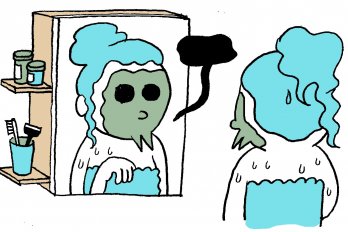In January, director Alex Gibney premiered Going Clear: Scientology and the Prison of Belief at the Sundance Film Festival in Park City, Utah. Based on Lawrence Wright’s acclaimed 2013 book of a similar name, the documentary presents a history of Scientology and a profile of its controversial founder, L. Ron Hubbard. The film also examines some of the many claims of abuse alleged by former followers.
The Church of Scientology has a long history of responding to its detractors with litigation and scathingly worded paid advertisements. In anticipation of such attacks, HBO Documentary Films reportedly hired 160 lawyers to examine the content of Going Clear.
The church responded to the film’s release with a full-page ad in the New York Times, which directed readers to Scientology’s online magazine:
Free speech is not a free pass to broadcast or publish false information. More than two years after Alex Gibney, Lawrence Wright and HBO started secretly working on their film glorifying bitter, vengeful apostates expelled as long as three decades ago from the Church, the one-sided result is as dishonest as Gibney’s sources. The Church has documented evidence that those featured in Gibney’s film regurgitating their stale, discredited allegations are admitted perjurers, admitted liars and professional anti-Scientologists whose living depends on the filing of false claims . . . That Gibney, co-producer Lawrence Wright and HBO have intentionally covered up relevant facts discrediting their sources speaks volumes about their bigoted agendas and the bias they hold toward people of any faith that doesn’t carry their stamp of approval.
The church also has contacted film critics who reviewed Alex Gibney’s documentary, with an email reading, “Your article reflects the film which is filled with bald faced lies.”
Sixteen years ago, the Church of Scientology launched a similar campaign against University of Alberta sociology professor Stephen Kent. This excerpt has been adapted from a letter he wrote on September 17, 1998, detailing the harassment.
I am a sociologist of religion, specializing in the area of alternative religions. Scientology is among the groups that I have studied. One of my articles on Scientology has appeared in a peer-reviewed journal, and I refer often to the organization in other articles that I publish on related “sociology of religion” topics. In 1997, I made invited presentations about Scientology before the German parliament’s commission to study “sects and psychological groups,” and later presented an academic paper on Scientology’s forced labour and re-indoctrination program—the Rehabilitation Project Force—at the Society for the Scientific Study of Religion conference in San Diego, California.
In September, 1997, what I consider to be an active “fair game” campaign began. [“Fair Game” is the term that Hubbard began using, in the 1950s, to describe his strategy of aggressively counterattacking people and groups he perceived to be enemies of the church.] First, local Scientologists picketed the area where thousands of U of A students were registering for classes. Within days, Scientologists picketed again on campus at the Students’ Union Building. Reports from numerous students indicated that the Scientologists carried placards that accused me of religious intolerance.
I believe that the campus protests, apparent media announcements, and provincial radio appearance were attempts to ruin my reputation in the communities in which I work and live.
In early June 1998, 3,000 home-delivered copies of the Edmonton Examiner contained a sixteen-page insert. The insert was printed on fairly high quality newsprint, and was entitled Freedom. This same insert also appeared in Canada’s national newspaper, the Globe and Mail, on June 12, 1998, in some delivered copies of the newspaper. Previously, the Globe and Mail had circulated the insert in newspapers distributed in Toronto.
On pages 8–9 of the issue (identified as Volume 2, Issue 1) was an article (without an author) entitled “Sowing the Seeds of Intolerance,” with smaller letters stating that “the intolerant and unorthodox views of University of Alberta sociologist Stephen Kent take on their full odour when viewed in context.” (The previous article in Freedom, entitled “Mass Suicide or Mass Media Deception,” also mentions Stephen Kent.) In my opinion, numerous statements in the Freedom insert are libellous.
The insert compared me to the neo-Nazi hate-monger Ernst Zundel, as did the first leaflet that Scientologists distributed against me on campus. The insert also says that my “support of discrimination and intolerance which has led to human rights violations and even violence—in Germany as well as in Canada—should disqualify Kent totally from government funding and support.”
[On October 16, 1998, the Globe and Mail apologized “for any embarrassment caused” and published a correction stating that the newspaper was “not aware of any factual foundation for the printed allegations made against Dr. Kent in those articles.”]
When they fail to silence me with each level of attack, they escalate. So, at first a Scientologist was writing against me to my department chair. Then the attacks against me elevated to include the campus community, my city, and my province. Then it escalated to include the most influential city in English-speaking Canada.
As an academic who works on controversial material involving allegations of abuse in reputedly religious contexts, I expect intense debate about some of my findings. The character assassinations, the harassment, the libel, and the attempts to ruin my professional reputation for speaking truthfully about Scientology’s abuses, however, reinforce my conclusion about the organization posing threats to democracy.
Among the reasons that I continue to research, write, and speak about Scientology is because I fear it, and I also fear its implications for civil society and for the lives of many of its members.
This appeared in the April 2015 issue.





